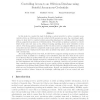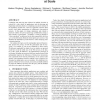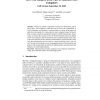26 search results - page 4 / 6 » Oblivious Transfers and Privacy Amplification |
PKC
2009
Springer
14 years 6 months ago
2009
Springer
In this work, we consider the task of allowing a content provider to enforce complex access control policies on oblivious protocols conducted with anonymous users. As our primary ...
PET
2010
Springer
13 years 9 months ago
2010
Springer
Combining and analyzing data collected at multiple locations is critical for a wide variety of applications, such as detecting and diagnosing malicious attacks or computing an acc...
CCS
2010
ACM
13 years 10 months ago
2010
ACM
Private Information Retrieval (PIR) protocols allow users to learn data items stored at a server which is not fully trusted, without disclosing to the server the particular data e...
NDSS
2008
IEEE
14 years 5 days ago
2008
IEEE
In [22] we showed that existing single-server computational private information retrieval (PIR) protocols for the purpose of preserving client access patterns leakage are orders o...
ESORICS
2010
Springer
13 years 6 months ago
2010
Springer
Norway has started to implement e-voting (over the Internet, and by using voters' own computers) within the next few years. The vulnerability of voter's computers was ide...



